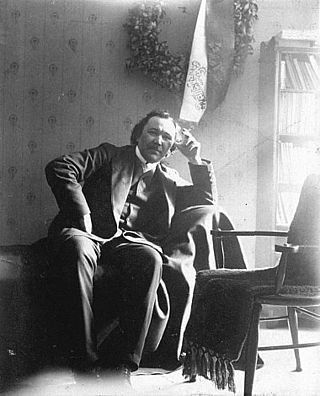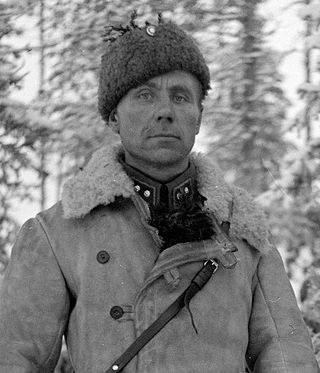Related Research Articles

Eino Leino was a Finnish poet and journalist who is considered one of the pioneers of Finnish poetry and a national poet of Finland. His poems combine modern and Finnish folk elements. Much of his work is in the style of the Kalevala and folk songs in general. Nature, love, and despair are frequent themes in Leino's work. He is beloved and widely read in Finland today.

Aarne may be a masculine given name and a surname. It is a Finnish and Estonian form of the given name Arne, a form of "Arnold". Notable people with the name include:
Gunnar is a male first name of Nordic origin. The name Gunnar means fighter, soldier, and attacker, but mostly is referred to by the Viking saying which means Brave and Bold warrior. King Gunnar was a prominent king of medieval literature such as the Middle High German epic poem, the Nibelungenlied, where King Gunnar and Queen Brynhildr hold their court at Worms. Gunder is a nordic variant, Günther is the modern German variant, and Gonario is the Italian version. Some people with the name Gunnar include:
Ilmari is a Finnish male given name. It is a short form of Ilmarinen, a mythological smith in the Kalevala. Notable people with the name include:
Ari is a given name in many languages and cultures, for both men and women. It also may be a nickname for a wide variety of unrelated names.
Eero is an Estonian and Finnish masculine given name. Notable people with the name include:
Leino is an Estonian masculine given name and a Finnish surname. Notable people with the name include:

Oscar or Oskar is a masculine given name of Irish origin.
Hannes is a masculine given name and a diminutive of Johannes or Hannibal.
Åke is a masculine Swedish given name, possibly derived from the medieval Germanic name Anicho, derived from ano meaning "ancestor". In Sweden, May 8 is the Name day for Åke. There are variant spellings, including the Danish/Norwegian Åge or Aage. Åke is uncommon as a surname. People with the name Åke include:
Aksel is a masculine name, used predominantly throughout Scandinavia, a variant of Axel.
Kaarlo is a Finnish given name. Notable people with the name include:
Risto is a masculine given name, found in Finnish, Estonian and South Slavic. In South Slavic, it is a hypocorism derived from Hristofor or Hristivoje. It may refer to:
Toivo is a masculine given name most commonly found in Estonia and Finland meaning hope. Alternately, it is a short form of the name Tobias.
Soinio is a Finnish surname. Notable people with the surname include:
Kalevi is a Finnish and Estonian masculine given name and surname. Notable people with the name include:
Martti is a Finnish and Estonian masculine given name. The name is the Finnish equivalent of the Latin name Martinus and originally refers to Mars, the god of war. It is a cognate of the name Martin. As of 1 January 2023, 531 men in Estonia have the first name Martti, making it the 275th most popular male name in the country.
References
- ↑ Balodis, Pauls (August 2009). "Personal Names of Livonian Origin in Latvia: Past and Present" (PDF). In Wolfgang Ahrens; Sheila Embleton; André Lapierre (eds.). Proceedings of the 23rd International Congress of Onomastic Sciences. 23rd International Congress of Onomastic Sciences. Toronto, Canada: York University. pp. 105–116. ISBN 978-1-55014-521-2 . Retrieved 23 April 2011.
- ↑ Language relationships are from other Wikipedia articles.